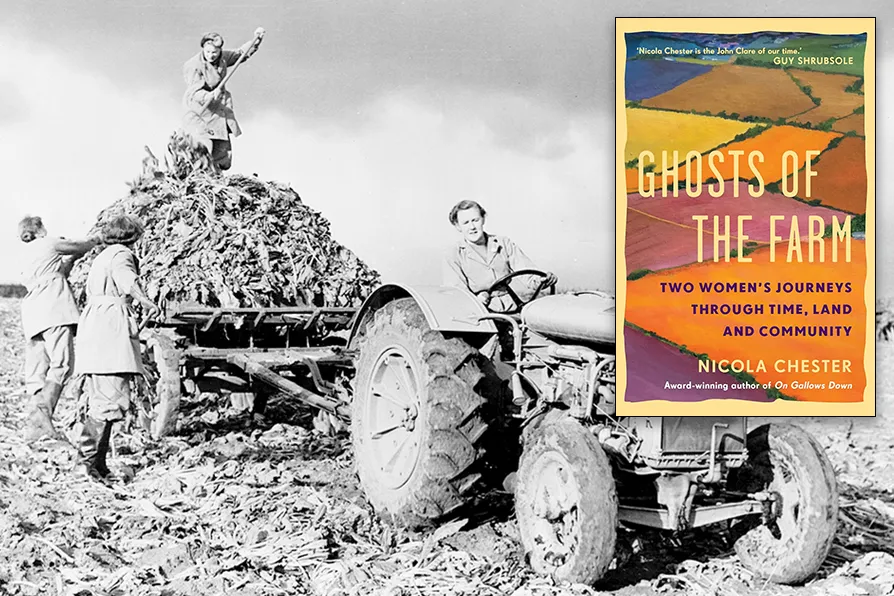JOHN GREEN, MARIA DUARTE and ANGUS REID review Fukushima: A Nuclear Nightmare, Man on the Run, If I Had Legs I’d Kick You, and Cold Storage
JOHN GREEN is enchanted by the story of women’s farm work, both now and the the 1940s, that brims with political and social insight

 Members of the British Women's Land Army harvesting beets, 1943. A woman is driving the Fordson tractor in the foreground, while three others with pitchforks are loading the beetroot's on the truck behind the tractor. [Pic: Public Domain]
Members of the British Women's Land Army harvesting beets, 1943. A woman is driving the Fordson tractor in the foreground, while three others with pitchforks are loading the beetroot's on the truck behind the tractor. [Pic: Public Domain]
Ghosts of the Farm: Two Women’s Journeys Through Time, Land and Community
Nicola Chester, Chelsea Green, £22
FOLLOWING her award-winning On Gallows Down — a passionate and very personal account of life in a rural community — Nicola Chester now gives us more of her insightful reflections on farming, nature and belonging, but from an unusual perspective.
This is a narrative about two women in different eras who both wanted to become farmers. Chester cleverly interweaves her own experience and dreams of becoming a farmer with that of Miss White, who lived in the author’s village 80 years before, a pioneer who realised her ambition to become a farmer during the second world war.
Was it easier for women to become farmers in the 1940s than it is now?
Moving between her own attempts find work in a farming context and Miss White’s dream to run a farm a generation earlier, Chester explores the parallels between their lives.
While she begins her tale somewhat offputtingly, like a horse story for girls, don’t give up: it soon becomes meatier. Her book, far from being a rollicking story of countryfolk, is an intelligent, questioning investigation of how farming has changed over the decades, from family farms before and during the war, to large and industrialised landholdings today, but told through the lives of two women.
There were challenges then, in the 1940s, when Miss White took the unusual career path of running her own farm. This was a time when women were deemed fit only to be dairy maids, cooks or casual labourers at harvest time and little else. Today, however, we face bigger challenges such as global warming, loss of wildlife through overuse of pesticides and over-efficient farming practices.
Julia White buys a derelict farm and begins to renovate and modernise it. While rats swarm in the outbuildings and barn owls ghost silently over the hedges, Chester draws connections with farming and rural life in both times, from the role of women in rural communities today and White’s experience in the 1940s. Rural life before and during the war years was rewarding in many ways and based very much on community rituals and values, but it was also harsh and there was much deprivation and poverty.
Chester wonders what life would have been like for Miss White during the 1940s. Since then, she writes, “we have continued to destroy wildlife, climate and the environment, and been provided with inconsistent and homogenised grants that don’t take locality, community and diversity into account.” She asks what farming might have been like today “if women instead had been allowed and enabled to continue when the men came back [from the war].”
She suggests that “even at this late hour for the environment, we need radical change and galvanising organisation around land use, nuanced and community driven, from leaders that include and listen to everybody, differently but on the scale we managed in the Second World War.” Then there was government intervention and planning to ensure the population would remain fed in the face of a relentless Nazi blockade. It amounted to a quasi-nationalisation of the land. We could do it then, so why not now?
Chester’s research into the past and comparisons with the present forms a link and illuminate her own battles to raise awareness of what is happening to rural communities and farming itself and to take action now before it is too late.
She writes with poetic intensity, painting indelible portraits of local people and landscape, but at the same time she asks pertinent questions, reflecting on where our society is going. She compares farming life in Britain with her own experience as a cowgirl and farmhand in Canada.
She tells us that “Canada is warming twice as fast as the rest of the world and climate breakdown is deeply rooted and driven at scale in a colonial, patriarchal capitalism, motivated in opposition to community, connection, nature and welfare.”
Ghosts of the Farm is a joy to read. One of those rare books that combine writing of high calibre with political and social insight.









